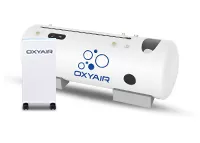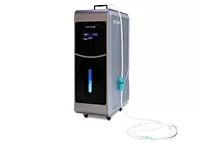Understanding Hydrogen Inhalation Therapy

Hydrogen has been around since the dawn of time, yet its potential therapeutic benefits have only been recognized in the medical realm over the last few centuries. Let's delve into how this humble element took a place in the spotlight of medical therapy, particularly as a breathable gas.
Historical Background
Discovery of Hydrogen's Therapeutic Properties
It was during the 18th century that the therapeutic properties of hydrogen were first discovered. The gas was found to have potential in alleviating certain medical conditions due to its unique molecular structure.
Early Use in Medicine
Fast forward to the early 20th century, hydrogen began to be utilized in medical applications, though its use was fairly limited due to the lack of advanced technology to harness its properties fully.
The Science Behind Hydrogen Inhalation Therapy
Molecular Hydrogen and Its Benefits
Molecular hydrogen (H2) is the smallest and lightest molecule, which allows it to easily penetrate cells and scavenge harmful free radicals. It’s its ability to selectively neutralize harmful radicals that places it at the center of therapeutic attention.
How Hydrogen Gas Is Administered
Hydrogen can be administered through various methods, including drinking hydrogen-rich water or inhaling hydrogen gas. Inhalation is considered to be the most effective method as it allows a higher concentration of hydrogen to be delivered directly to the body.
Benefits of Hydrogen Inhalation Therapy
Antioxidant Properties
One of the most touted benefits of hydrogen inhalation therapy is its antioxidant properties. By neutralizing harmful free radicals, it supports cellular health and combats oxidative stress, a key player in the aging process and many diseases.
Anti-inflammatory Effects
Inflammation is a response of the body to injury or infection. However, chronic inflammation can lead to diseases. Hydrogen has shown promise in reducing inflammation, making it a potential ally in fighting inflammatory conditions.
Neuroprotective Effects
Research suggests that hydrogen inhalation therapy may have neuroprotective effects, potentially aiding in the treatment and prevention of neurodegenerative diseases like Alzheimer's and Parkinson’s.
Safety and Side Effects
Common Side Effects
The safety profile of hydrogen inhalation therapy is generally considered to be good, with few reported side effects. However, like any therapy, individual responses may vary.
Precautions and Considerations
Certain precautions should be taken when considering hydrogen therapy, especially for individuals with pre-existing medical conditions or those on medication.
Current Research and Future Directions
Notable Studies
Numerous studies have been conducted to explore the therapeutic potential of hydrogen, with many showing positive results in a variety of health conditions.
Potential New Applications
With each passing day, new research sheds light on the diverse applications of hydrogen therapy. From potential benefits in managing chronic pain to aiding in metabolic disorders, the horizon of hydrogen therapy's applications is broadening.
How to Access Hydrogen Inhalation Therapy
Treatment Centers and Providers
There are various treatment centers and healthcare providers offering hydrogen inhalation therapy. It's advisable to choose a reputable provider to ensure the safety and efficacy of the treatment.
At-home Solutions
The advent of at-home hydrogen inhalation devices has made this therapy more accessible. These devices allow individuals to experience the benefits of hydrogen therapy in the comfort of their homes.
Conclusion
Hydrogen Inhalation Therapy is a promising field with a good safety profile and a growing body of research supporting its potential benefits. Its antioxidant, anti-inflammatory, and neuroprotective properties make it a compelling option for those looking to enhance their health and well-being.
FAQs
Is Hydrogen Inhalation Therapy safe?
Yes, it is generally considered safe with few reported side effects. However, individuals with certain medical conditions or on medication should consult with a healthcare provider before undergoing this therapy.
How often can you undergo this therapy?
The frequency of therapy sessions can vary based on individual needs and the recommendations of a healthcare provider.
What conditions can it help with?
Hydrogen Inhalation Therapy may help with a variety of conditions including chronic inflammation, oxidative stress, and neurodegenerative diseases.
Are there any notable studies on Hydrogen Inhalation Therapy?
Yes, numerous studies have been conducted exploring the therapeutic potential of hydrogen in various health conditions.
Where can I get Hydrogen Inhalation Therapy?
Hydrogen Inhalation Therapy can be accessed through certain treatment centers, healthcare providers, or at-home hydrogen inhalation devices.














